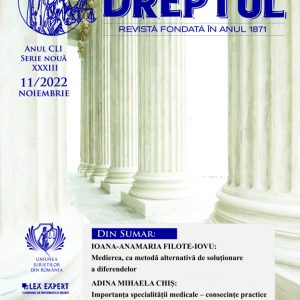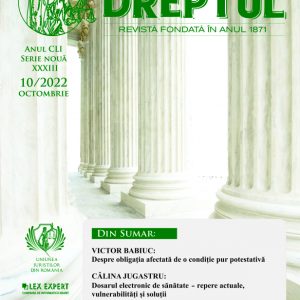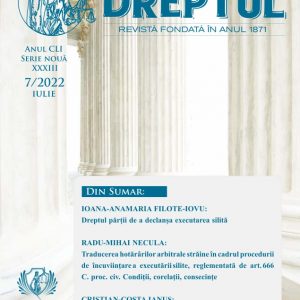-
 In this study, the author aims to present the relevant aspects of mediation, as an alternative means of resolving disputes that the parties may use by virtue of availability, highlighting both its advantages and the reasons why the law governing it has become increasingly less applied. In addition, there are situations in which the courts have been called to approve mediation agreements, but also the author’s opinion regarding the need to use the optional procedure, except for disputes in the field of family law, which should be analyzed by judges, who are the most able to pronounce solutions that correspond most faithfully to the best interests of the child.
In this study, the author aims to present the relevant aspects of mediation, as an alternative means of resolving disputes that the parties may use by virtue of availability, highlighting both its advantages and the reasons why the law governing it has become increasingly less applied. In addition, there are situations in which the courts have been called to approve mediation agreements, but also the author’s opinion regarding the need to use the optional procedure, except for disputes in the field of family law, which should be analyzed by judges, who are the most able to pronounce solutions that correspond most faithfully to the best interests of the child. -

-
 The study addresses a field of great practical interest, that of traffic contraventions. The perspective is one that combines in a balanced manner the doctrinal elements with the jurisprudential ones, the author proving a very good knowledge of the points of debate and of divergence in this matter. In the study there are included also elements that serve to differentiate the contravention from the offence, with references to the doctrine that has addressed this issue, but also the analysis of the most common differences of opinion, of interpretation and of application of the law. Among these there are: the forced intervention in the matter of the settlement of contraventional complaints, the balance between the presumption of innocence of the petitioner and the presumption of legality of the official report of the contravention, as well as the difficulties in establishing the judicial truth in the matter of contraventional complaints.
The study addresses a field of great practical interest, that of traffic contraventions. The perspective is one that combines in a balanced manner the doctrinal elements with the jurisprudential ones, the author proving a very good knowledge of the points of debate and of divergence in this matter. In the study there are included also elements that serve to differentiate the contravention from the offence, with references to the doctrine that has addressed this issue, but also the analysis of the most common differences of opinion, of interpretation and of application of the law. Among these there are: the forced intervention in the matter of the settlement of contraventional complaints, the balance between the presumption of innocence of the petitioner and the presumption of legality of the official report of the contravention, as well as the difficulties in establishing the judicial truth in the matter of contraventional complaints. -
 The study briefly analyzes the status of the deputy mayor in relation to the status of the public administrator in order to debate a possible conflict between them. The similarities and differences between these two functions are highlighted. The delegation of attributions by the mayor is discussed from the perspective of the possibility for the mayor to appoint like substitute the public administrator during his vacation. There are three situations provided by law in which the deputy mayor becomes the legal substitute of the mayor presented in detail in the study: the vacancy of the position of mayor; the suspension from office of the mayor and the cases of impossibility to exercise the mandate by the mayor. In any other situation, there is no legal provision for the deputy mayor to become the legal substitute for the mayor. Two issues need to be debated in this context, namely: identification of the status of the public administrator in the public administration staff and like a consequence, the legal nature of the management contract concluded by public administrator with the mayor. Finally, it is argued the impossibility of suspending the addendum to the management contract, under the conditions of Article 14 of the Law on Administrative Litigation.
The study briefly analyzes the status of the deputy mayor in relation to the status of the public administrator in order to debate a possible conflict between them. The similarities and differences between these two functions are highlighted. The delegation of attributions by the mayor is discussed from the perspective of the possibility for the mayor to appoint like substitute the public administrator during his vacation. There are three situations provided by law in which the deputy mayor becomes the legal substitute of the mayor presented in detail in the study: the vacancy of the position of mayor; the suspension from office of the mayor and the cases of impossibility to exercise the mandate by the mayor. In any other situation, there is no legal provision for the deputy mayor to become the legal substitute for the mayor. Two issues need to be debated in this context, namely: identification of the status of the public administrator in the public administration staff and like a consequence, the legal nature of the management contract concluded by public administrator with the mayor. Finally, it is argued the impossibility of suspending the addendum to the management contract, under the conditions of Article 14 of the Law on Administrative Litigation. -
 The error of random distribution of a civil case refers, in the matter of means of appeal, unlike the scenarios in which it is necessary to qualify or requalify a means of appeal, only the situation where the will of the party exercising the means of appeal is disregarded, respectively it is not registered on the role of the court of judicial control and, subsequently, randomly distributed the means of appeal exercised by the party, but another means of appeal, due to a genuine error occurred at the time of the registration of the means of appeal or, as sometimes happens in the judicial practice, because at the time of the registration of the means of appeal it is assessed that the party did not exercise the means of appeal provided by law, thus proceeding to the registration of the means of appeal provided by law, which should have been exercised by the party, and not of the means of appeal that was actually exercised.
The error of random distribution of a civil case refers, in the matter of means of appeal, unlike the scenarios in which it is necessary to qualify or requalify a means of appeal, only the situation where the will of the party exercising the means of appeal is disregarded, respectively it is not registered on the role of the court of judicial control and, subsequently, randomly distributed the means of appeal exercised by the party, but another means of appeal, due to a genuine error occurred at the time of the registration of the means of appeal or, as sometimes happens in the judicial practice, because at the time of the registration of the means of appeal it is assessed that the party did not exercise the means of appeal provided by law, thus proceeding to the registration of the means of appeal provided by law, which should have been exercised by the party, and not of the means of appeal that was actually exercised. -

-
 This study aims to analyse the meaning of the term „reasonable grounds” enshrined in paragraph (2) of Article 11 of Law No 554/2004 on Administrative Proceedings. Neither the relevant framework law, nor any other regulation defines this concept, which creates problems in practice. The tendency in case law is to consider that „reasonable grounds” must be understood as a situation beyond the person’s control, insurmountable, in case of force majeure or fortuitous event. The present study seeks to correct this view and to promote the interpretation that the notion can be understood both in the sense mentioned above and in one where the parties use administrative methods to prevent a dispute from arising.
This study aims to analyse the meaning of the term „reasonable grounds” enshrined in paragraph (2) of Article 11 of Law No 554/2004 on Administrative Proceedings. Neither the relevant framework law, nor any other regulation defines this concept, which creates problems in practice. The tendency in case law is to consider that „reasonable grounds” must be understood as a situation beyond the person’s control, insurmountable, in case of force majeure or fortuitous event. The present study seeks to correct this view and to promote the interpretation that the notion can be understood both in the sense mentioned above and in one where the parties use administrative methods to prevent a dispute from arising. -
 In the case of the debate by the Romanian notary public of a succession with an element of extraneity, in which the registered shares of a limited liability company are subject to succession, the successional devolution will be carried out according to the law applicable to the succession (lex successionis). The point of connection for the lex successionis is the last habitual residence of the natural person, but this person can choose the law applicable to the succession, his national law. According to the lex successionis, there will be established the heirs, but they will not automatically become associates in the limited liability company. The acquisition of the status of associate will be carried out according to the provisions of the law governing the organic status of the legal person (lex societatis), being a matter which concerns the functioning of the company, not the transmission by succession of the registered shares, which operates anyway, but an effect of devolution. The two laws may belong to different national systems of law. In the case of the application of the Romanian law, we intended to find out possible controversial aspects, presenting the doctrinal interpretations or the judicial practice ones and even trying to formulate some proposals de lege ferenda. We also tried to make a comparison with the material French corporate law, for the hypothesis in which de cujus would have registered shares in a limited liability company of French nationality.
In the case of the debate by the Romanian notary public of a succession with an element of extraneity, in which the registered shares of a limited liability company are subject to succession, the successional devolution will be carried out according to the law applicable to the succession (lex successionis). The point of connection for the lex successionis is the last habitual residence of the natural person, but this person can choose the law applicable to the succession, his national law. According to the lex successionis, there will be established the heirs, but they will not automatically become associates in the limited liability company. The acquisition of the status of associate will be carried out according to the provisions of the law governing the organic status of the legal person (lex societatis), being a matter which concerns the functioning of the company, not the transmission by succession of the registered shares, which operates anyway, but an effect of devolution. The two laws may belong to different national systems of law. In the case of the application of the Romanian law, we intended to find out possible controversial aspects, presenting the doctrinal interpretations or the judicial practice ones and even trying to formulate some proposals de lege ferenda. We also tried to make a comparison with the material French corporate law, for the hypothesis in which de cujus would have registered shares in a limited liability company of French nationality. -

-

-
 Thanks to his social status, his activity, the social relationships he develops, interest in technology, etc., the child has acquired a certain legitimacy to be able to make recommendations on the purchase of a good or service. Of course, professionals are aware of the reverse socialization that takes place within family relationships and have begun to develop products that are intended for children or that, through children, can reach the bosom of families, although those do not concern children. The purpose of this study is to prove that any child is a vulnerable consumer, although he has at his disposal countless methods of information. The child is not capable of complex cognitive functions. Being a consumer means not only acquiring skills and technical routines, but also an awareness of real needs and values, something that can only happen with the development of each individual. The vulnerability that is specific to the child is a matter of social status of the skills and resources that protect each individual and carry extrinsic and partially intrinsic aspects. By analysing the European and national legal frameworks on consumer protection, I have tried to identify a clear definition of the vulnerable consumer, as well as what the concept of „vulnerable consumer” is based on.
Thanks to his social status, his activity, the social relationships he develops, interest in technology, etc., the child has acquired a certain legitimacy to be able to make recommendations on the purchase of a good or service. Of course, professionals are aware of the reverse socialization that takes place within family relationships and have begun to develop products that are intended for children or that, through children, can reach the bosom of families, although those do not concern children. The purpose of this study is to prove that any child is a vulnerable consumer, although he has at his disposal countless methods of information. The child is not capable of complex cognitive functions. Being a consumer means not only acquiring skills and technical routines, but also an awareness of real needs and values, something that can only happen with the development of each individual. The vulnerability that is specific to the child is a matter of social status of the skills and resources that protect each individual and carry extrinsic and partially intrinsic aspects. By analysing the European and national legal frameworks on consumer protection, I have tried to identify a clear definition of the vulnerable consumer, as well as what the concept of „vulnerable consumer” is based on. -

